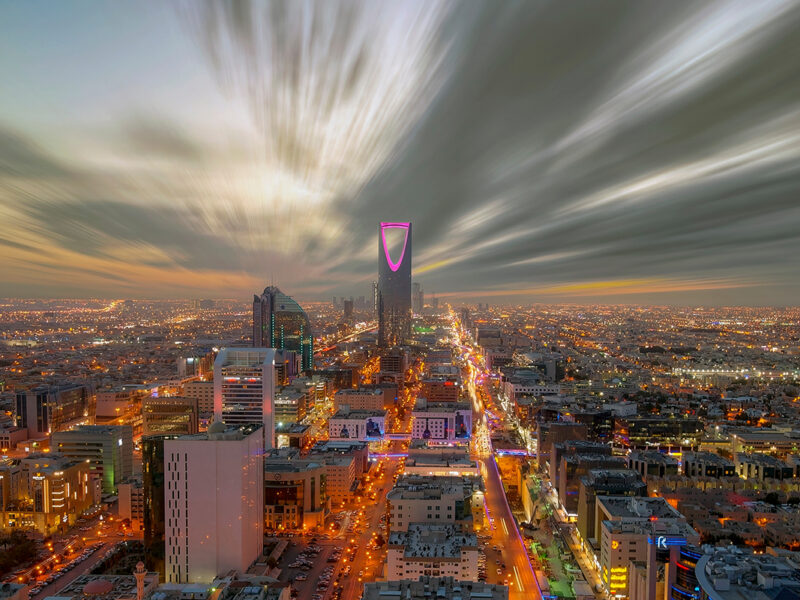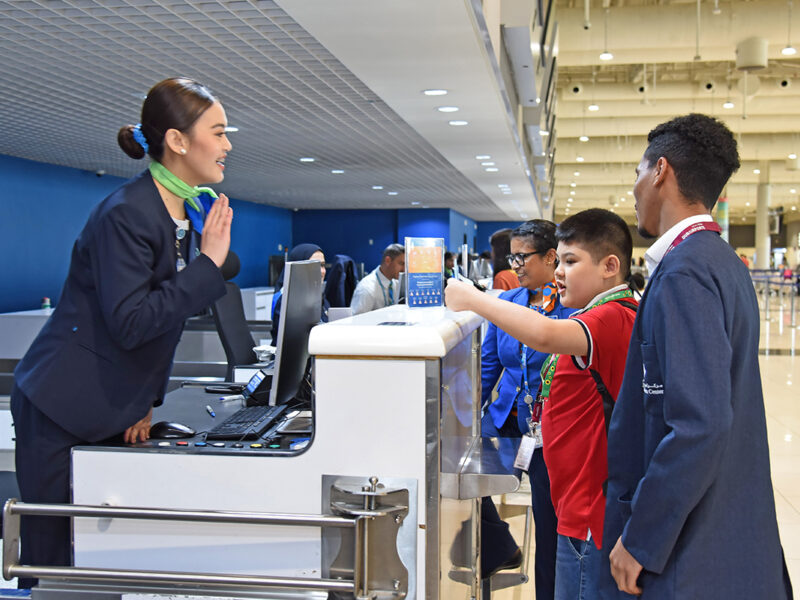Armed with a charming smile, sharp jawline, rich black hair and a well-built profile, Maaz Sheikh could easily pass for a character in one of the shows streaming on his company’s Starz Play TV service, or better yet, a Marvel superhero.
While he is not out to save the world, the 49-year-old CEO has an even bigger mission: staying ahead of Netflix in the Middle East and North Africa.
Forget ‘Netflix and chill’, in the Arab world, Sheikh says it’s Starz Play all day for the Dubai-based streaming service’s over one million subscribers in 19 countries, where the regional heavyweight beats Netflix’s 18.39 percent market share with a 23.97 percent cut.
What gives us strength is the fact that where Netflix sees problems and challenges, we see opportunities and hope
And it’s only getting bigger, offering thousands of blockbuster Hollywood movies, TV shows, documentaries, kids’ entertainment and dedicated Arabic and Bollywood content with the help of its main investor, US entertainment corporation Lionsgate.
“They knew it would work,” Sheikh says of Lionsgate, the California-based conglomerate behind successful movie franchises like The Hunger Games, Twilight and Divergent.
They were right. Since its launch in 2014, Starz Play has doubled its revenue and subscriber numbers every six months. In 2018, it announced expansion plans in Africa, India and Pakistan, where it signed a joint venture with Pakistani cinema chain Cinepax to boost its potential consumer reach from 350 million to over 500 million. But Sheikh has only just begun to scratch the surface.
 There is a strong global shift towards over-the-top (OTT) subscription services, according to Maaz Sheikh
There is a strong global shift towards over-the-top (OTT) subscription services, according to Maaz Sheikh
The global online subscription video market (OTT) is estimated to reach $125 billion by 2025, according to a report by Grand View Research, while MENA’s OTT sector alone is expected to surge 50 percent by 2020, according to global research firm IHS Markit. In 2018, it stood at almost 25 percent of the Pay TV sector in the region.
Has streaming killed the TV star?
The rise of streaming means traditional TV has taken the hit. Not only do streaming platforms offer consumers heaps of original content and Hollywood blockbusters at the same time they hit cinema screens, they do it at less than a quarter of the price.
In the United Arab Emirates, a Starz Play subscription costs less than $10 per month (Netflix charges $15), compared to a minimum $100 traditional TV subscription.
I think the region needs a few more exits and liquidity, then investors will become more confident
“When was the last time you sat in front of a TV and flipped channels?” Sheikh asks.
For many in the UAE, the last time might have been in 2014, when on-demand streaming surpassed traditional TV viewing, according to Ericsson’s ConsumerLab TV & Media UAE Report. By 2022, over the top (OTT) subscriptions in MENA are expected to grow 80-fold from 2013, with subscribers increasing twice as fast as those of pay TV, according to a 2018 HIS market report.
Sheikh’s former employer, pay TV subsidiary OSN (Panther Media Group Limited), where he worked as chief operating officer before leaving in 2013, experienced a 10 percent drop in Q3 revenue in 2018 compared to the same period in 2017, leading its biggest shareholder Kuwait Projects Company (KIPCO) to hire bankers in November last year in a bid to sell its 60.50 percent stake. OSN, which declined to invest in Sheikh’s Starz Play, launched its own streaming service Wavo. The platform falls behind rivals Starz Play, Netflix, Icflix and iflix and has a lower regional market share of 5.74 percent.
 Starz Play is aiming to consolidate its dominant regional market share
Starz Play is aiming to consolidate its dominant regional market share
Nevertheless, Sheikh argues that markets such as Sub-Saharan African and Francophone Africa will keep linear television alive for at least five years, but says traditional TV providers will have to “redefine their service to survive. They have to do something very different”.
The X factor
He himself has taken a different approach with Starz Play, which has allowed him to overtake Netflix in the region.
“We are dealing with an audience that is comparing us to a global experience, product and brand. Netflix benefits a lot from its global spillover, whether it’s on marketing, awareness or word of mouth. We need to compete with that, so we need to hold our own,” Sheikh says.
We are dealing with an audience that is comparing us to a global experience, product and brand
“What gives us strength is the fact that where Netflix sees problems and challenges, we see opportunities and hope… As long as we continue to [do that], have a very good chance of staying ahead of Netflix,” says Sheikh.
While the US streaming favourite delayed its launch in MENA (it introduced services in the UAE in 2016) due to challenges such as low credit card penetration in the region, Starz Play capitalised on the “nuances” by localising its entire service line, starting with providing more payment options by partnering with 21 regional operators.
For example, customers in the UAE can pay for Starz Play’s service through their Etisalat mobile phone number, while those in Saudi can sign up through Saudi Telecom Company (STC) or Mobily. In Egypt, they can pay via Vodafone or Orange. In countries like the UAE where fixed broadband is popular, consumers can enjoy Starz Play on Etisalat’s set-top box. In North Africa, where fixed broadband is not as attainable or affordable, the platform offers its service through mobile plans, some of which do not count data consumed while streaming.
 Starz Play plans to release up to 50 new shows in 2019
Starz Play plans to release up to 50 new shows in 2019
What has set Starz Play apart is its understanding of the local market, which is also an element that many US companies get wrong, according to Sheikh.
“The high-tech mind-set in the US is all about intellectual property. It’s all about artificial intelligence, machine learning and who has got the most complex IT intensive product. That’s what they do over there and compete on,” he says.
“But if you look at [regional ride-hailing app] Careem when they first started, their two differentiations were that they accepted cash and had call centre agents who spoke Arabic. It is that simple. People in Silicon Valley look at those things with surprise.”
The major [production studios] at a global level are so big that they don’t see us as a threat
“I was in Saudi a month ago, and I didn’t have Saudi Riyals on me and I got into a Careem assuming that these guys take credit card. When I finished my meeting and was coming back and said I’ll pay with a credit card, the guy looked at me like I was from the moon. These are the nuances we miss and underestimate. But it is not very different for us – people don’t want to use a credit card, even if they have one. And if they don’t have one, they still want an online service that lets them watch those TV shows. We think these are the things that are making a difference.”
Original content
Starz Play’s focus on local content is also one of its key strengths. While Hollywood content gave it the “jump it needed”, it is its Arabic and Bollywood offerings (which are subtitled or dubbed in Arabic to cater to a massive following of local fans) that lure in many millennials. The younger generation makes up around 70 to 80 percent of the platform’s viewers.
 Hollywood blockbusters are key to Starz Play’s success
Hollywood blockbusters are key to Starz Play’s success
But millennials also want original content, an area where Netflix has invested millions of US dollars. For Sheikh, however, original content is not yet worth a massive investment. He doesn’t want to compete with production studios.
“The more Netflix goes into its original content, the more they are competing with the Hollywood studios. We forget that 90 percent of the top Hollywood shows are still coming out of those studios, including Warner, Fox, Disney, Sony – and we work with all of them. So the more Netflix competes with the major studios, the more it is advantageous for us,” he says.
“Those big shows that are coming out of the studios need a home in the Middle East and Africa – and it won’t be Netflix, it will be us.”
2019-2020 will be the year of exists. Some of them will be very big, and lots of them will be small
Some of those shows include favourite American sitcom Friends, for which Netflix paid $100m in 2018 for rights to continue streaming it in 2019. Sheikh claims that the US platform initially introduced the show on its platform after it witnessed its success on Starz Play. The sitcom, he confirms, will remain on Starz Play “whether it comes off Netflix or not.”
“I read the same news that you are following and sometimes you can’t tell if it’s a publicity stunt or if it’s actually going to happen. But it’s definitely on our service. In fact, we had it in the region before Netflix did. They saw the success of Friends on our service,” he says.
“Unless you have real insights into what people are watching, you cannot estimate whether Friends will work in Egypt or not. But we saw it working and so we doubled down on it and then Netflix looked at how successful it was for us on social media, and they went and acquired the rights for it.”
 Arabic drama series are hugely popular on the Starz Play platform
Arabic drama series are hugely popular on the Starz Play platform
But it pays to be smaller than Netflix.
Starz Play invests carefully in few originals, with the content making up less than five percent of its volume. One of its most successful original shows is Power starring rapper 50 Cent, while others include Howard’s End and Black Sails. So how does it get away with producing the content without enraging production houses?
“The major [production studios] at a global level are so big that they don’t see us as a threat,” says Sheikh.
In fact, when Starz Play first launched, investors in the region had dismissed the concept of a regional streaming company entirely.
Those big shows that are coming out of the studios need a home in the Middle East – and it will be us
“Most people will underestimate when you are just getting started. That’s what happened to us. We were talking to everyone in the region looking for investment and collaboration. People underestimated us and investors did not believe in streaming becoming successful in the region. They thought it was going to take 10 to 12 years.”
“Everyone said ‘this region isn’t ready, the infrastructure isn’t ready, the consumer behaviour isn’t there’… The reality couldn’t have been more different,” he says.
The year of exits
Unfortunately, the reality that many regional start-ups lack investor funding continues today. But according to Aramex founder and executive chairman of Wamda Capital, Fadi Ghandour, more successful exits in 2019 will encourage more investment in MENA.
 Bollywood movies with Arabic subtitles are a hit among viewers
Bollywood movies with Arabic subtitles are a hit among viewers
“2019-2020 will be the year of exists. Some of them will be very big, and lots of them will be small, but exits will happen and funds will finally start returning money to investors, encouraging new ones to believe and invest more,” he told Arabian Business in January.
Sheikh agrees. Similarly to Ghandour, who failed to find regional investment for Aramex in its early days, Sheikh failed to find support in the region for Starz Play in the beginning. But he believes change is coming.
“We didn’t have investors [in the Middle East] at that time, but I also see that over the past four years, the venture capital industry as well as the start-up landscape here has completely changed. You have a few start-up funds that have come to light in the region, like Middle East Venture Partners, and Saudi Telecom has started a fund called ST Ventures.”
 Popular TV series Friends will remain on Starz Play
Popular TV series Friends will remain on Starz Play
He add: “I think the region needs a few more exits and liquidity, then investors will become more confident. If people like Wamda can go back to their investors and say, ‘your return on investment will be three or four times [your initial investment] on this fund, because this company got sold,’ I think it will be more institutionalised.”
Was it difficult for Sheikh to quit a high-paid job at broadcast giant OSN to take the risk of failing in a regional SME market that suffers from a $260bn funding gap?
 Fadi Ghandour, executive chairman of Wamda Capital
Fadi Ghandour, executive chairman of Wamda Capital
“There is beauty in stability, in taking that pay check every month regardless of how well the company is doing or not doing. There is beauty in staying in one company for 20 years, which I think works for some people,” he says.
“But I’m an entrepreneur at heart. Of course, it’s a little bit of a dream. But if you go strictly by logic, it’s not going to work.”
 Starz Play leads the industry in the UAE with a 23.97 percent market share
Starz Play leads the industry in the UAE with a 23.97 percent market share
“I think everyone needs to dream. If there is no hope and there are no dreams, what are people living for?”
Sheikh once had a dream of being an engineer, but he didn’t believe he was “smart enough”.
Yet it doesn’t seem to have held him back. Instead, he has created the largest streaming service in MENA. And he is proof that, with enough backing, and a little bit of dreaming, regional companies can take on even a multi-billion dollar global competitor like Netflix – and win.
 NYSE-listed Lionsgate Entertainment is Starz Play’s parent company
NYSE-listed Lionsgate Entertainment is Starz Play’s parent company
MENA pay TV impacted by piracy, OTT platforms
The past two years have seen pay TV revenues decline in the Middle East and North Africa region, according to Digital TV Research’s latest ‘Middle East and North Africa Pay TV Forecasts’ report. The report cited piracy and competition from over-the-top (OTT) media services as the chief reasons as revenue per user numbers fell in the region.
The Middle East and North Africa Pay TV Forecasts report from Digital TV Research found that pay TV revenues for 20 MENA countries declined 11 percent to just under $3bn between 2016 and 2018.
Pay TV revenues across the region are forecasted to be lower in 2024 at $3.28bn, than the 2016 revenues which stood at $3.36bn.
The research found that within the 13 Arab-speaking countries in MENA, pay TV revenues fell 16 percent from $1.25bn in 2016 to $1.06bn in 2018, but are expected to recover by 2024 to $1.43bn. In terms of subscriber numbers, pay TV fell 9.5 percent between 2016 and 2018 to 3.40 million subscribers, but are expected to hit 5.23 million by 2024.
The rise of OTT platforms such as Netflix and Starz Play has seen traditional TV struggle to retain consumers who opt for cheaper, on-demand streaming as opposed to Pay TV. Arabic-language streaming services are expected to grow in the Middle East in 2019, according to the general manager & senior vice president at Fox Networks Group MENA & Pakistan. Sanjay Raina, due to high demand for Arabic content.









